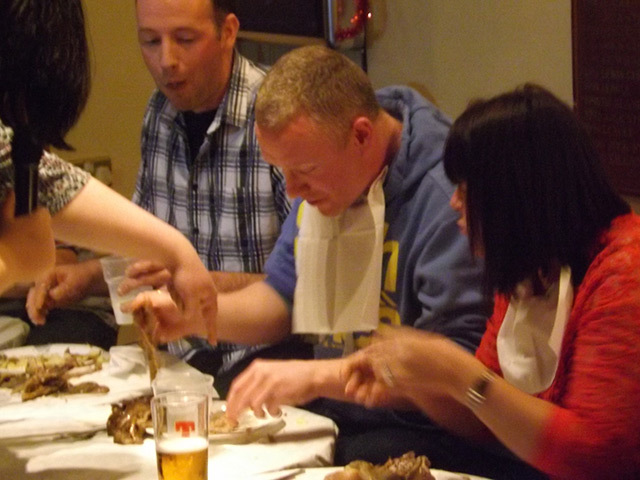
An oil rig worker has become Scotland’s latest world champion, at eating pickled baby gannets.
A crowd of 40 people watched Peter MacCritchie take just 3 minutes 44 seconds to demolish half a guga, as the delicacy is known and a stipulated 14oz of potatoes.
Mr Macritchie, 33, of Glasgow, finished just one second before Willie Macritchie, no relation, – from Ness, during the first World Guga Eating Championships on Lewis on Saturday night.
Eight competitors, including one woman, Amelia Macdonald, competed for the title.
The guga, known for their overpowering odour during cooking, were boiled in a local woman’s home before being brought to Ness FC Social Club, so that its distinctive smell did not linger in the building.
Originally it was hoped to have 20 competitors but the difficulty in sourcing such a large number of gugas, which are highly prized by locals, proved beyond organisers.
There was some controversy before the championships began when the initial rule over insisting that the bird’s rubbery skin must be eaten was relaxed to allow competitors to make their own culinary choice.
All bar one of the contestants drank milk, which is supposed to aid the meal’s digestion. The one exception was Ms Macdonald, who opted for lager.
She was the only one not to finish her meal.
The gannet chicks are hunted on Sula Sgeir, a rocky islet 40 miles north of Ness.
Men from the district travel to the remote island for two weeks every summer to cull, under licence, 2,000 guga. The birds are then preserved in salt and eaten throughout the year.
Peter MacCritchie, who was born in Ness, said: “I never thought I would become a world champion at anything.
“The last time I ate guga was last year. I had a little bit of trouble finishing because I ran out of milk. I think I could go quicker and if I am here next year I would like a chance to defend my title. Guga is an acquired taste but I like it.”
Main organiser Donald Macsween said the real prize was “the honour and the glory of being world champion.”
He said: “We relaxed the rule over eating the skin because it was a bit of a stumbling block.”
He added: “The guga is an important part of our heritage and history and very much a part of who we are in Ness. We are very proud of the guga.”